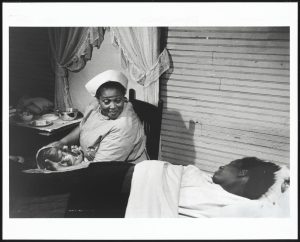“At the end of the day, people won’t remember what you said or did; they will remember how you made them feel.” – Maya Angelou
 Before the 1930s, most births occurred in the home, with the help of family, female friends, and midwives. These birth attendees provided physical and emotional support, maintained a hygienic space, administered medicine, and monitored the mom and baby throughout the birthing process.
Before the 1930s, most births occurred in the home, with the help of family, female friends, and midwives. These birth attendees provided physical and emotional support, maintained a hygienic space, administered medicine, and monitored the mom and baby throughout the birthing process.
Doulas and midwives occupy an important place in Black history. According to the National Museum of African American History & Culture, “midwifery has existed for centuries prior to its earliest recorded practice in the United States. Experienced midwives were among the many enslaved individuals who survived the middle passage and continued to practice and train others as the primary source of birth care throughout the country.” During slavery, Black midwives assisted other enslaved women and birthing people during their labor and deliveries and commonly attended the births of their slave masters’ children as well. They also played an important role in maintaining ancestry records, even when family members were sold off and separated from each other.
After slavery, since hospitals were inaccessible to many families in the south, Black midwives, often called “Granny Midwives,” continued to assist in the births of both Black and white infants. These midwives were seen as community healers and incorporated African traditions of rituals and homeopathic remedies to their patients. Home births attended by midwives remained the norm until the early 20th Century, when giving birth became increasingly medicalized – and maternal and infant mortality rates increased.
In 1921, with the passage of the Sheppard-Towner Act, a federally funded public health workforce was created to address infant and maternal mortality rates. This workforce was overwhelmingly white and was the genesis of the modern nurse-midwife. “These same white nurse-midwives also became the cudgel that would control, suppress, and eliminate the Black, Indigenous, and immigrant midwifery workforce from 1920 to 1945, both as teachers and as state agents of legal and regulatory enforcement.”
During those changing times, physicians also began to exclude Black midwives from attending births, framing their work as unhygienic, unscientific, and unprofessional and blamed them for the increased infant mortality rates. By 1945, only 15% of births were attended by midwives. Throughout the 20th Century, “[m]edical professionals began to rely heavily on intervention methods (including cesarean deliveries, induction, epidural, artificially rupturing membranes, and the episiotomy), that may not have been medically necessary in otherwise low-risk pregnancies.” This overmedicalization led to the need for additional personalized support, thus leading to the newfound interest in midwives in the 1970s and the popularization of doulas in the 1980s. However, the birthwork field remained – and still remains – very white, with more than 60% of doulas and 90% of midwives being white in 2024.
In the past several years, due to increased attention on the racial disparities in maternal and infant health, more doula and midwife training programs have focused on recruiting Black participants. Black doulas and midwives have been shown to improve Black maternal and infant health outcomes and are being integrated into more birth programs. While the future of Black birthwork is exciting, there are still hurdles that Black doulas and midwives have to navigate. Carmen Southall-Wamhoff is a long-time doula, midwife in training, and member of the Missouri MOMNIBUS Steering Committee and first FLOURISH Community Leaders Cabinet. While she is glad to be able to fill an important role for moms, babies, and women in general, it can also be exhausting to have to be so persistent in advocating for her clients to have positive birth outcomes. She says, “It shouldn’t be as hard as it is. It can feel like two steps forward and one step back.” Despite the difficulties of her role as a Black doula, she acknowledges that it is also important to have the energy to keep going. Carmen is excited to bring this same energy to midwifery clients in the community – hopefully in the fall of 2024! After all, well behaved women rarely make history.